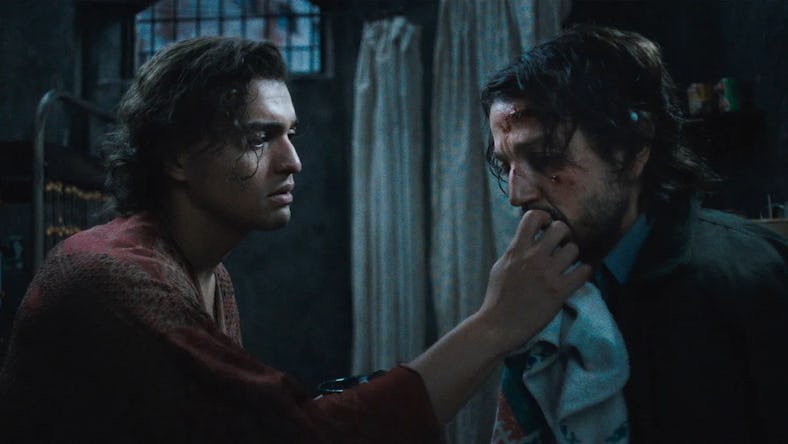Kiss of the Spider Woman Injects Hollywood Spectacle Into A Surreal Queer Romance
Give them the old razzle dazzle.

Everyone loves a story about stories — and Hollywood is no exception. From Neverending Story to The Princess Bride, storytelling has proven to be a compelling cinematic traditions, at least when it strikes a balance. Of course for every movie with the magic of Big Fish there’s a Prairie Home Companion — slightly too earnest, too meta, too wrapped up in itself. Thankfully, Manuel Puig’s surreal ode to the power of storytelling, Kiss of the Spider Woman, seems immune to such pitfalls. The story has received yet another powerful Hollywood adaptation that shows the versatility of this genre and the staying power of this 49-year-old story.
First published in 1976, Puig’s story of two Argentinian prison cellmates whiling away the time by recounting the plots of films to each other, has been adapted to both the screen and the stage, most famously as the Oscar-winning 1985 film starring William Hurt. The glitzy new silver screen version, directed by Bill Condon, adapts the 1993 Broadway musical adaptation of Kiss of the Spider Woman, and in the process, updates the somewhat surreal, esoteric story for modern audiences used to glamorous Hollywood musicals and sweeping queer romances, making for maximum crowdpleasing efficiency. As cynical as that sounds, you can’t help but get lost in it. It works.
Kiss of the Spider Woman opens with Luis Molina (breakout star Tonatiuh), a gay windowdresser charged with “corrupting a minor,” being taken to his cell at an Argentinian prison in 1981. It’s the height of the Dirty War, during which the Argentine Anticommunist Alliance cracked down on political dissidents and “sexual deviants” like Luis. Molina finds himself sharing a cell with one of the most outspoken revolutionaries, Valentin Arregui (Diego Luna, at his most grimly noble). The intellectual Valentin chafes at sharing a cell with someone as flamboyant and frivolous as Luis, who frequently declares that he never cared for politics. And Valentin chafes even further when Luis, to pass the time, begins to recount the plot of his favorite movie, an old Hollywood musical called Kiss of the Spider-Woman, starring his favorite actress, the glamorous Ingrid Luna (Jennifer Lopez). But as Luis recounts the movie — the kitschy, melodramatic fictional film intercutting with Luis and Valentin’s grim reality — Valentin gradually becomes engrossed by the story, and the two men start to form a deep and unshakeable bond.
Jennifer Lopez is perfectly cast as a Classic Hollywood diva.
Reading Puig’s Kiss of the Spider Woman novel is a singular experience — the book is written in a stream-of-consciousness narrative, reality and fiction blending together until you’re unsure which is which. It’s a classic of magical realism — a surreal genre that is difficult to adapt to the big screen. It’s these thorny, complex elements that Condon’s Kiss of the Spider Woman sidesteps altogether, opting for a much broader, but no less moving, story of queer romance against a politically troubled backdrop.
The film lives and dies by Tonatiuh and Luna’s chemistry, which thankfully, they have in spades. As Luis and Valentin get closer, Luna starts to play up a sort of giddy, uncertain excitement — the walls of his formerly stoic revolutionary beginning to fall as Valentin finds himself first entranced by Luis’ story, then by Luis himself. And Tonatiuh imbues his every scene opposite Luna with a quiet yearning, which manifests in his recounting of the film itself: he imagines Ingrid Luna’s love interest to look like Valentin, and the forsaken sidekick to look like himself. The film is at its strongest when it’s the two of them verbally sparring or, as their circumstances get more dire, taking comfort in each other. Outside of these two, in the world of the musical, the film is less sure of itself, though it does slowly find its footing.
Condon, who is no stranger to big-screen musicals after directing Dreamgirls and Disney’s Beauty and the Beast remake, can’t seem to get a handle on how to shoot a Classic Hollywood musical. The first musical sequences are clumsily inserted and simply shot — looking more like a sequence out of a streaming movie than an ode to ‘50s Hollywood song-and-dance. Jennifer Lopez does a lot of heavy lifting here, relying on her charisma to give these somewhat pedestrian numbers a little razzle dazzle. Lopez is in excellent form, leaning into the big, broad drama that the era calls for and impressing in even the most complicated dance numbers. But even in these musical sequences, Tonatiuh is a standout — easily the most impressive dancer and performer, and the only one to truly understand the melodrama of the movie musical: one sequence in which he contemplates his gender identity through song is absolutely stunning.
Despite the disappointingly simple nature of the early musical sequences, Condon and his Dreamgirls cinematographer Tobias Schliessler do finally start to find the magic — one later glittery musical number at a cabaret feels straight out of a Stanley Donen film, with Lopez getting to put on a frenzied showcase of her dancing skills. It’s fitting that as the film gets more comfortable with its musical side that Valentin and Luis start to grow closer; it’s here that the film’s intercutting between reality and the glamorous fictional movie starts to get more frantic — a terrific ramp-up to a beautiful emotional climax that hammers in its bittersweet queer romance.
Kiss of the Spider Woman is not a perfect movie, but it’s perfectly earnest. Its wholesome embrace of movie musicals and queer identity makes it hard to dislike the movie, even if it doesn’t pull off every musical number or every tonal shift elegantly. It’s big, broad, and a little kitschy, with an undeniably moving queer romance at its center. Is there a better story than that?